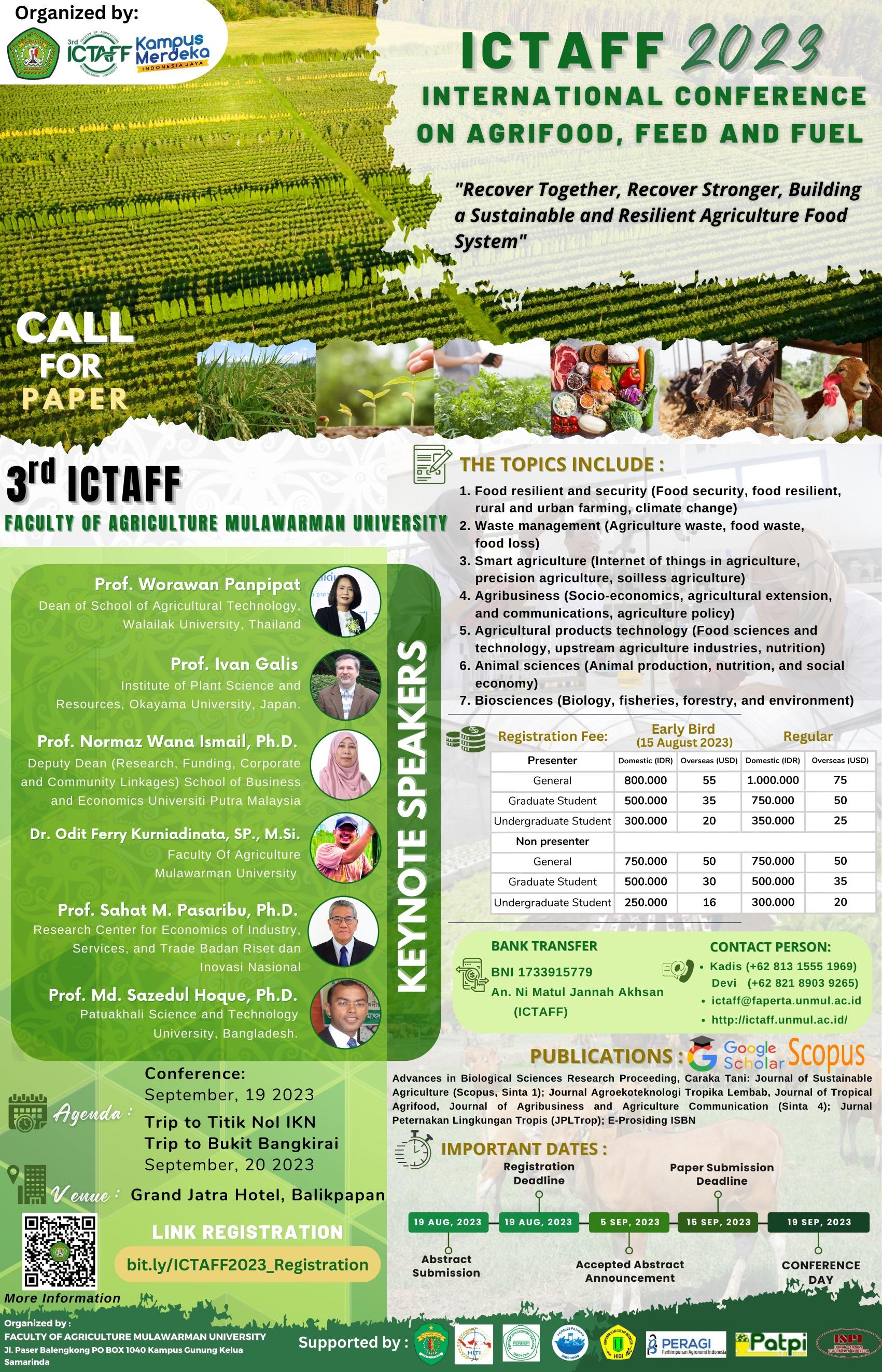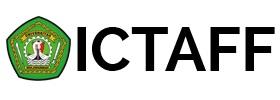
International Conference on Tropical Agrifood, Feed, and Fuel (ICTAFF) 2023
Will Be Held in Samarinda by Faperta Unmul
In the early 2020s, the world was hit by a multi-dimensional crisis that caused a slowdown and even a decline in growth in various sectors. Starting with the Pandemic Covid-19 which has devastated all human life. The Pandemic has brought a negative impact on economic growth in various sectors. Moreover, the crisis continued with European geopolitical tensions involving Russia, Ukraine, and NATO. In Asia, tension occurs in the South China Sea region. Coupled with global climate change that never ended. This multi-dimensional disaster has created a serious food crisis in all countries. As many as 282 million people are unsure of where their next meal is coming from. Food insecurity has been increasing since 2018. Even before the Russian invasion of Ukraine, the increasing frequency and severity of climate shocks, regional conflicts, and pandemics were all taking their toll, disrupting food production and distribution, and driving up the cost of feeding people and families. Despite the global economic recession, the agricultural sector is believed to be a beacon of hope in maintaining economic stability. The agricultural sector not only guarantees food availability but also absorbs a large number of laborers, reduces poverty, and improves people's welfare.
Post Covid-19 pandemic, the demand for quality food products continues to increase. However, increasing the productivity and quality of agricultural products faces many challenges. Several factors constrain the supply of sustainable food, including global climate change, availability of agricultural raw water, declining soil fertility, conversion of agricultural land in areas of production centers, plant-pest and diseases, and a decrease in the number of farming families. In the early 2020s, the world was hit by a multi-dimensional crisis that caused a slowdown and even a decline in growth in various sectors. Starting with the Pandemic Covid-19 which has devastated all human life. The Pandemic has brought a negative impact on economic growth in various sectors. Moreover, the crisis continued with European geopolitical tensions involving Russia, Ukraine, and NATO. In Asia, tension occurs in the South China Sea region. Coupled with global climate change that never ended. This multi-dimensional disaster has created a serious food crisis in all countries. As many as 282 million people are unsure of where their next meal is coming from.
Food insecurity has been increasing since 2018. Even before the Russian invasion of Ukraine, the increasing frequency and severity of climate shocks, regional conflicts, and pandemics were all taking their toll, disrupting food production and distribution, and driving up the cost of feeding people and families. Despite the global economic recession, the agricultural sector is believed to be a beacon of hope in maintaining economic stability. The agricultural sector not only guarantees food availability but also absorbs a large number of laborers, reduces poverty, and improves people's welfare.
Post Covid-19 pandemic, the demand for quality food products continues to increase. However, increasing the productivity and quality of agricultural products faces many challenges. Several factors constrain the supply of sustainable food, including global climate change, availability of agricultural raw water, declining soil fertility, conversion of agricultural land in areas of production centers, plant-pest and diseases, and a decrease in the number of farming families.
The university as a center for the development of science, technology, and innovation is expected to be able to provide the best solutions for increasing production and maintaining the quality of food products. Harness essential science, innovation, and technology to meet the global challenges of producing food more efficiently, improving nutrition, and helping families who are subjected to agriculture to live more resilient lives. Researchers are required to innovate and develop an approach to reduce global poverty, hunger, and malnutrition in facing complex and dynamic challenges from both the ecological (biotic and abiotic) and social dimensions.
The Faculty of Agriculture, Mulawarman University, is a center of excellence for tropical studies located in East Kalimantan, the province that will become the new capital of Indonesia. Has a social responsibility to solve the problem of the global food crisis through the dissemination of research results and innovations. Therefore, in 2023 we will be holding the 3rd ICTAFF International Seminar (The 3rd International Conference On Tropical Agrifood, Feed, and Fuel). Since 2018, the ICTAFF conference is a biennial dissemination agenda that has been conducted by the Faculty of Agriculture, University of Mulawarman. The 3rd ICTAFF 2023 has the theme “Recover together, Recover Stronger: Building a Sustainable and Resilient Agriculture Food System”.
The 3rd ICTAFF is expected to become a forum for researchers in the field of agriculture to disseminate innovation, research that has been conducted, and ideas. Apart from researchers from Mulawarman University, we also invite researchers from other universities in Indonesia, and experts from various countries such as Japan, Thailand, Malaysia, and Bangladesh.
The theme of the conference is “Recover together, Recover Stronger: Building a Sustainable and Resilient Agriculture Food System”. There are 7 sub themes scope of conference will be addressed in invited talks and submission of papers:
1. Food
Resilient and security (Food security, food resilient, Rural and urban farming,
climate change)
2. Waste
management (Agriculture waste, food waste, food loss)
3. Smart
agriculture (Internet of things in agriculture, Precision agriculture, soilless
agriculture)
4. Agribusiness
(Socio-economics, Agricultural extension, and communications, Agriculture
policy)
5. Agricultural
products technology (Food sciences and technology, Upstream agriculture
industries, nutrition)
6. Animal
sciences (Animal production, nutrition, and social economy)
7. Biosciences
(Biology, fisheries, forestry, and environment)
1. Prof.
Worawan Panpipat (Dean of School of Agricultural Technology, Walailak
University, Thailand)
2. Prof.
Dr. Ivan Galis (Institute of Plant Science and Resources, Okayama University,
Japan)
3. Prof.
Normaz Wana Ismail (Deputy Dean (Research, Funding, Corporate and Community
Linkages) School of Business and Economics Universiti Putra Malaysia)
4. Prof.
Sahat M.Pasaribu, Ph.D (Research Center for Economics of Industry, Services,
and Trade Badan Riset dan Inovasi Nasional (BRIN))
5. Dr. Odit
Ferry Kurniadinata, S.P., M.Si. (Associate Professor Department of
Agroecotechnology, Faculty of Agriculture, Mulawarman University, Indonesia.)
6. Prof.
Md. Sazedul Hoque, Ph.D. (Pathuakhali Science and Technology University,
Bangladesh)
ICTAFF 3RD
